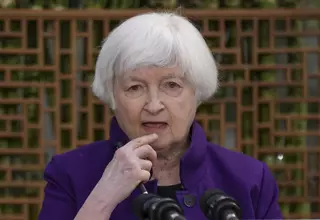Singapore Casinos Made an Error: Cutting Out Gangsters
Singapore wanted nothing to do with the often questionable gaming middlemen who proliferate in Macau. The gambling houses in Macau get around China’s currency controls by relying on so-called junket operators to extend credit to mainland high rollers, a business model that has been linked to organized crime groups known as triads, says Steve Vickers, chief executive at risk consultant Steve Vickers & Associates. But lately, Singapore’s two casinos appear to be paying the price of their government restricting that setup.
Chinese VIP gamblers patronize both cities — and account for about half of all Singapore gaming revenue, says Grant Govertsen, an analyst at Union Gaming Advisors. And bad debts are mounting in both cities as gamblers have a hard time adjusting to China’s corruption crackdown and slowing economic growth.
There’s a big difference in how casinos feel the pain, however. In Macau — which, like Hong Kong, is a special administrative region of China — about 180 licensed go-betweens provide credit to their customers and collect the money they owe. Singapore has just three licensed junket operators, who mainly help with foreign travel arrangements. So gaming losses there fall squarely on the casinos’ shoulders.
The burden is growing. Casino operator Genting Singapore and billionaire Sheldon Adelson’s Las Vegas Sands, parent of Singapore’s Marina Bay Sands casino, already have reported hundreds of millions of dollars in receivables, or outstanding debts, on their balance sheets. Genting has established a record reserve to cover debts that are uncertain to be repaid. More will probably have to be set aside, according to Union Gaming. Receivables and notes that Genting Singapore is owed but hasn’t collected totaled $787.5 million in 2014, more than doubling from $369 million in 2010, according to data compiled by Bloomberg. That’s about four times the average at Macau’s six biggest casino operators.
The junket setup in Macau, the only part of China where gambling is legal, gives gaming houses some protection from such charges. In good times, junket operators take a slice of profits that would otherwise go to the casino in exchange for bringing in groups of high-stakes gamblers with whom they have relationships. In bad times, they shield the gaming company from some of the losses by handling their own collections — with some using everything from public shaming of indebted clients in their hometowns in China to physical intimidation.
“Singapore casinos are dealing directly with the VIP players,” says Govertsen. “That makes it a lot tougher to collect receivables because they don’t have the typical resources that junket operators would have to collect such gambling debts.”
Singapore officials didn’t want its two casinos to rely on such outsiders. “The business model of junkets is inherently designed to usurp laws and regulations related to lending, money flows, and other elements,” says Jonathan Galaviz, a partner at Global Market Advisors, a tourism consultant. “Singapore didn’t want to risk its reputation as an ethical global financial center.”
Singapore is trying to use judicial means to compel dozens of Chinese gamblers to pay up. Last year its two casinos filed 49 lawsuits against individuals in Singapore’s High Court for gaming-related debts, up from just two a year earlier. The resorts brought 12 more cases in the first quarter of 2015. Val Chua, spokeswoman at Marina Bay Sands, and Lee Sin Yee, spokeswoman at Genting’s Resorts World Sentosa resort in Singapore, declined to comment. Singapore’s Casino Regulatory Authority didn’t immediately respond to questions.
Last month, China’s government set its lowest annual growth target in more than 15 years, a bad omen for real estate prices. “A lot of these Chinese VIPs have money stuck in property investments, and they’re probably having trouble liquidating those assets to pay off those debts,” says Samuel Yin, an analyst at Maybank Kim Eng in Kuala Lumpur.
While junket operators might be helpful in such times, says Vickers, “a major problem … is that a need for extra-legal services means that many junkets have close links to triad societies.” Those extra-legal services include debt collection and running prostitution rings inside casinos, he says.
A mainland gang in 2005 beat a man to death while seeking repayment of 1.8 million yuan ($291,000) he lost at a Macau casino. Chinese police handle more than 200 cases annually of illegal imprisonment of gamblers for unpaid Macau debts, according to a 2012 report by the government-controlled newspaper Xinxi Shibao.
Bloomberg Businessweek
Tags: Keywords:POPULAR READS
Yellen Says Iran's Actions Could Cause Global 'Economic Spillovers'
Iran's missile attack on Israel early Sunday came in response to what it says was an Israeli strike on Iran's consulate in Syria.Prabowo Camp Cites ‘Procedural Error’ in Legal Challenge by Rival Candidates
The Constitutional Court's main task is to address alleged discrepancies in vote tallies, which neither of the plaintiffs challenged.Apple Wants to Increase Investments in Vietnam
Vietnam has become more important to Apple as the company seeks to diversify its supply chains away from China.China’s Top Diplomat Wang Yi to Visit Indonesia for Cooperation Talks
Chinese top diplomat Wang Yi will chair a policy coordination meeting aimed at strengthening Indonesia-China cooperation.President Jokowi Urges Global Restraint as Tensions Rise in the Middle East
President Joko "Jokowi" Widodo emphasized the importance of diplomatic efforts to prevent the escalation of conflict in the Middle EastPopular Tag
Most Popular






















